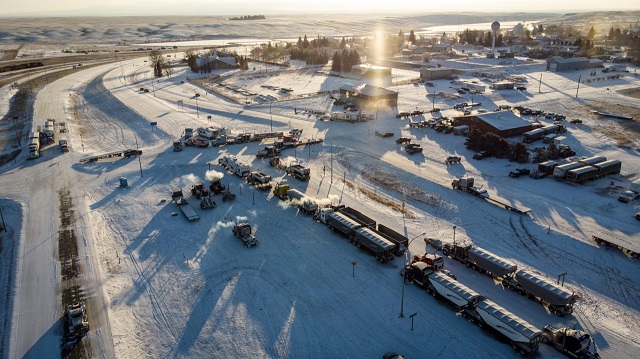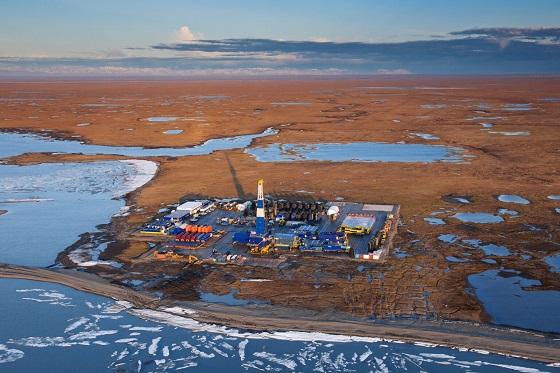Alberta
‘Coutts Two’ Verdict: Bail and Mischief

Protesters demonstrating against COVID-19 mandates and restrictions gather as a truck convoy blocks the highway at the Canada-U.S. border crossing in Coutts, Alta., on Feb. 2, 2022. The Canadian Press/Jeff McIntosh
From the Frontier Centre for Public Policy
By Ray McGinnis
Imagine spending over two years behind bars, only to be told the evidence never supported the charges against you.
On Aug. 2, a Lethbridge jury found Chris Carbert and Tony Olienick not guilty of the most serious charge of conspiracy to commit murder of police officers. However, though they were declared innocent, the conspiracy charge was the basis for their being held in remand for at least 925 days. They were denied bail based on this charge.
The sentencing hearing for other charges against Carbert and Olienick is taking place this week.
Granting Bail Typical for Serious Offences
In Canada, when someone is charged with committing a crime, they’re released on bail. This includes those charged with murder. For example, in September 2021, 31-year-old Umar Zameer was released on bail after being charged with the first-degree murder of Toronto Police Constable Jeffrey Northrup.
A case of double murder in the city of Mission in B.C.’s Fraser Valley concerned the deaths of Lisa Dudley and her boyfriend Guthrie McKay. Tom Holden, accused of first-degree murder in the case, was released on bail.
Conditions for not Granting Bail
Why do we release people from custody after being charged with a crime? Why don’t we hold people indefinitely? It’s been a Canadian tradition that there’s a process in place to which we adhere. Does the person charged with a crime seem to present a risk of repeating an offence? Carbert and Olienick hadn’t previously committed the offence(s) they were charged with. They didn’t have any criminal records for any violence. So, the likelihood of repetition of offence didn’t apply.
Another reason for denying bail is flight risk. But the Crown agreed neither of these men posed a flight risk. If you’re not clear about the identity of the person you’ve arrested, you can hold them in custody. But the Crown and the RCMP were certain of the identity of these men.
How about denying bail for evidence protection? If let go, was it possible the Crown or RCMP would lose evidence, and they needed to keep Carbert and Olienick in remand? No.
Were Carbert or Olienick considered a danger to the public? No. They had no past history of committing violent crimes, so in the case of the Coutts Two this was not a reason to deny bail.
The Crown insisted the pair be denied bail because their release would undermine confidence in the judicial system. Due to the seriousness of the offences the pair were charged with, releasing them would put the legal system into disrepute. But this is a circular argument. In authoritarian countries, police may arrest citizens on serious charges they’re not guilty of and leave them in prison indefinitely.
Granting Bail Goes Back to Magna Carta
Since the Magna Carta was signed in 1215, western judicial institutions have allowed those charged with a crime to be presumed innocent until proven guilty. With that provision comes the right to bail and a speedy trial. When citizens are accused of a crime and left to rot in prison without having their day in court, their spirits can be broken and persuaded to agree to plead guilty even when they are innocent.
Unindicted Co-conspirators Never Interviewed
During the trial, the Crown repeatedly named a list of unindicted co-conspirators. Each had a licence to carry a weapon in public for years. None of them were ever searched. None of them were ever interviewed. None of the alleged co-conspirators received any communication from the RCMP, or other authorities, about their possible connection to a conspiracy to murder police officers. However, the list of names provided for some legal theatre in the court added to the ominous scale of the supposed conspiracy to murder police officers.
Intelligence
Former career police officer Vincent Gircys had standing in the Justice Mosley decision. The judge ruled in January 2024 that the government’s invocation of the Emergencies Act in February 2022 to end the convoy protests was unconstitutional.
After the Coutts Two verdict, Gircys was concerned about the intelligence. There was a disconnect between the conspiracy charge and the evidence the Crown brought to trial. Gircys stated, “It’s really important to find where that disconnect is. Because of faulty intelligence? False intelligence? Fabricated intelligence? The evidence that they (RCMP) do have would all be logged, gathered, and time-lined. And that goes to what evidence was not gathered? … How could that information have been laid in the first place? How could the Crown have proceeded with this case to begin with?”
The Coutts Two were found not guilty of conspiracy to commit murder. But by the time they are sentenced on the other charges this week, they will have spent at least 925 days in custody. What does this mean for innocent until proven guilty?
Ray McGinnis is a Senior Fellow with the Frontier Centre for Public Policy. His forthcoming book is “Unjustified: The Emergencies Act and the Inquiry that Got It Wrong.”
Alberta
The case for expanding Canada’s energy exports

From the Canadian Energy Centre
For Canada, the path to a stronger economy — and stronger global influence — runs through energy.
That’s the view of David Detomasi, a professor at the Smith School of Business at Queen’s University.
Detomasi, author of Profits and Power: Navigating the Politics and Geopolitics of Oil, argues that there is a moral case for developing Canada’s energy, both for Canadians and the world.
CEC: What does being an energy superpower mean to you?
DD: It means Canada is strong enough to affect the system as a whole by its choices.
There is something really valuable about Canada’s — and Alberta’s — way of producing carbon energy that goes beyond just the monetary rewards.
CEC: You talk about the moral case for developing Canada’s energy. What do you mean?
DD: I think the default assumption in public rhetoric is that the environmental movement is the only voice speaking for the moral betterment of the world. That needs to be challenged.
That public rhetoric is that the act of cultivating a powerful, effective economic engine is somehow wrong or bad, and that efforts to create wealth are somehow morally tainted.
I think that’s dead wrong. Economic growth is morally good, and we should foster it.
Economic growth generates money, and you can’t do anything you want to do in social expenditures without that engine.
Economic growth is critical to doing all the other things we want to do as Canadians, like having a publicly funded health care system or providing transfer payments to less well-off provinces.
Over the last 10 years, many people in Canada came to equate moral leadership with getting off of oil and gas as quickly as possible. I think that is a mistake, and far too narrow.
Instead, I think moral leadership means you play that game, you play it well, and you do it in our interest, in the Canadian way.
We need a solid base of economic prosperity in this country first, and then we can help others.
CEC: Why is it important to expand Canada’s energy trade?
DD: Canada is, and has always been, a trading nation, because we’ve got a lot of geography and not that many people.
If we don’t trade what we have with the outside world, we aren’t going to be able to develop economically, because we don’t have the internal size and capacity.
Historically, most of that trade has been with the United States. Geography and history mean it will always be our primary trade partner.
But the United States clearly can be an unreliable partner. Free and open trade matters more to Canada than it does to the U.S. Indeed, a big chunk of the American people is skeptical of participating in a global trading system.
As the United States perhaps withdraws from the international trading and investment system, there’s room for Canada to reinforce it in places where we can use our resource advantages to build new, stronger relationships.
One of these is Europe, which still imports a lot of gas. We can also build positive relationships with the enormous emerging markets of China and India, both of whom want and will need enormous supplies of energy for many decades.
I would like to be able to offer partners the alternative option of buying Canadian energy so that they are less reliant on, say, Iranian or Russian energy.
Canada can also maybe eventually help the two billion people in the world currently without energy access.
CEC: What benefits could Canadians gain by becoming an energy superpower?
DD: The first and primary responsibility of our federal government is to look after Canada. At the end of the day, the goal is to improve Canada’s welfare and enhance its sovereignty.
More carbon energy development helps Canada. We have massive debt, an investment crisis and productivity problems that we’ve been talking about forever. Economic and job growth are weak.
Solving these will require profitable and productive industries. We don’t have so many economic strengths in this country that we can voluntarily ignore or constrain one of our biggest industries.
The economic benefits pay for things that make you stronger as a country.
They make you more resilient on the social welfare front and make increasing defence expenditures, which we sorely need, more affordable. It allows us to manage the debt that we’re running up, and supports deals for Canada’s Indigenous peoples.
CEC: Are there specific projects that you advocate for to make Canada an energy superpower?
DD: Canada’s energy needs egress, and getting it out to places other than the United States. That means more transport and port facilities to Canada’s coasts.
We also need domestic energy transport networks. People don’t know this, but a big chunk of Ontario’s oil supply runs through Michigan, posing a latent security risk to Ontario’s energy security.
We need to change the perception that pipelines are evil. There’s a spiderweb of them across the globe, and more are being built.
Building pipelines here, with Canadian technology and know-how, builds our competitiveness and enhances our sovereignty.
Economic growth enhances sovereignty and provides the resources to do other things. We should applaud and encourage it, and the carbon energy sector can lead the way.
Agriculture
Growing Alberta’s fresh food future

A new program funded by the Sustainable Canadian Agricultural Partnership will accelerate expansion in Alberta greenhouses and vertical farms.
Albertans want to keep their hard-earned money in the province and support producers by choosing locally grown, high-quality produce. The new three-year, $10-milllion Growing Greenhouses program aims to stimulate industry growth and provide fresh fruit and vegetables to Albertans throughout the year.
“Everything our ministry does is about ensuring Albertans have secure access to safe, high-quality food. We are continually working to build resilience and sustainability into our food production systems, increase opportunities for producers and processors, create jobs and feed Albertans. This new program will fund technologies that increase food production and improve energy efficiency.”
“Through this investment, we’re supporting Alberta’s growers and ensuring Canadians have access to fresh, locally-grown fruits and vegetables on grocery shelves year-round. This program strengthens local communities, drives innovation, and creates new opportunities for agricultural entrepreneurs, reinforcing Canada’s food system and economy.”
The Growing Greenhouses program supports the controlled environment agriculture sector with new construction or expansion improvements to existing greenhouses and vertical farms that produce food at a commercial scale. It also aligns with Alberta’s Buy Local initiative launched this year as consumers will be able to purchase more local produce all year-round.
The program was created in alignment with the needs identified by the greenhouse sector, with a goal to reduce seasonal import reliance entering fall, which increases fruit and vegetable prices.
“This program is a game-changer for Alberta’s greenhouse sector. By investing in expansion and innovation, we can grow more fresh produce year-round, reduce reliance on imports, and strengthen food security for Albertans. Our growers are ready to meet the demand with sustainable, locally grown vegetables and fruits, and this support ensures we can do so while creating new jobs and opportunities in communities across the province. We are very grateful to the Governments of Canada and Alberta for this investment in our sector and for working collaboratively with us.”
Sustainable Canadian Agricultural Partnership (Sustainable CAP)
Sustainable CAP is a five-year, $3.5-billion investment by federal, provincial and territorial governments to strengthen competitiveness, innovation and resiliency in Canada’s agriculture, agri-food and agri-based products sector. This includes $1 billion in federal programs and activities and $2.5 billion that is cost-shared 60 per cent federally and 40 per cent provincially/territorially for programs that are designed and delivered by provinces and territories.
Quick facts
- Alberta’s greenhouse sector ranks fourth in Canada:
- 195 greenhouses produce $145 million in produce and 60 per cent of them operate year-round.
- Greenhouse food production is growing by 6.2 per cent annually.
- Alberta imports $349 million in fresh produce annually.
- The program supports sector growth by investing in renewable and efficient energy systems, advanced lighting systems, energy-saving construction, and automation and robotics systems.
Related information
-

 National1 day ago
National1 day agoLiberal bill “targets Christians” by removing religious exemption in hate-speech law
-

 Business2 days ago
Business2 days agoCanada invests $34 million in Chinese drones now considered to be ‘high security risks’
-

 Economy2 days ago
Economy2 days agoAffordable housing out of reach everywhere in Canada
-

 Business1 day ago
Business1 day agoLooks like the Liberals don’t support their own Pipeline MOU
-

 Business2 days ago
Business2 days agoThe Climate-Risk Industrial Complex and the Manufactured Insurance Crisis
-

 Crime1 day ago
Crime1 day agoInside the Fortified Sinaloa-Linked Compound Canada Still Can’t Seize After 12 Years of Legal War
-

 Health2 days ago
Health2 days agoThe Data That Doesn’t Exist
-

 Business1 day ago
Business1 day agoCanada Can Finally Profit From LNG If Ottawa Stops Dragging Its Feet




